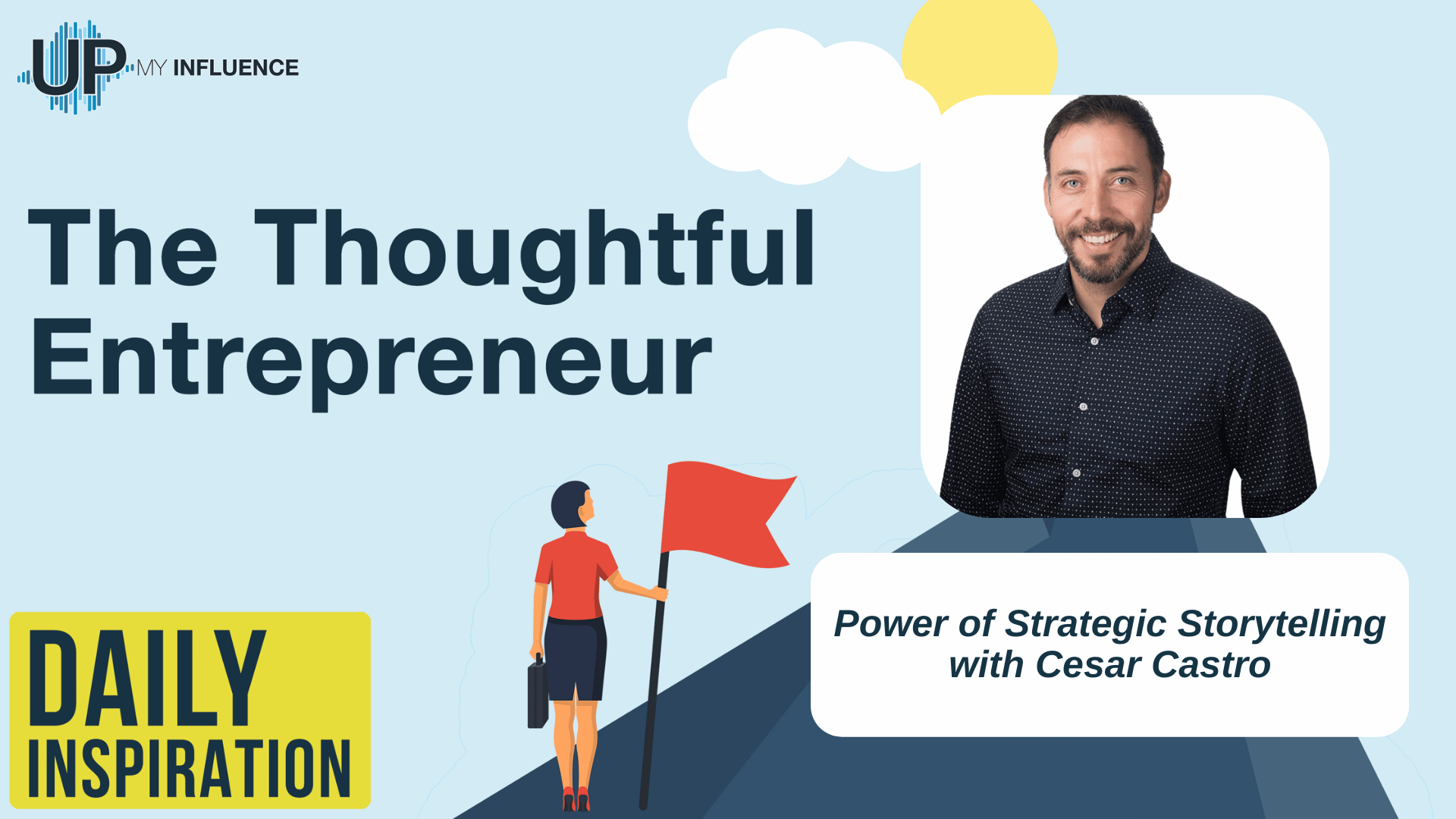THE THOUGHTFUL ENTREPRENEUR PODCAST
In this episode of the Thoughtful Entrepreneur, your host Josh Elledge speaks to the Founder & Speaker of Strategic Storytelling LLC, Cesar Castro.

Cesar Castro is a dedicated mentor on a mission to elevate the narrative prowess of business professionals and leaders. During our discussion, Cesar illuminated storytelling's profound influence in effectively conveying messages, ideas, products, and services. He passionately shared how a well-crafted story can resonate deeply with an audience, creating lasting connections and engagement.
The crux of Cesar's message lies in the undeniable need for leaders to hone their storytelling skills. It's not just about relaying information; it's about forging a bond with your audience. Cesar underscored the power of storytelling to build relationships and captivate listeners, allowing for a more profound and meaningful exchange.
One of the highlights of the conversation was Cesar's introduction of the “COSA” method—a storytelling framework that stands for Context, Obstacle, Solution, and Action. He talked about the importance of setting the scene, presenting challenges, and showcasing vulnerability.
Cesar's commitment to empowering leaders is evident in the array of services he provides. From workshops and leadership team training to one-on-one coaching, he's dedicated to refining his clients' communication and storytelling skills. He also offers an online academy, courses, and a podcast for those eager to dive deeper into the art of storytelling.
Key Points from the Episode:
- Importance of storytelling in business
- Connecting with the audience through storytelling
- Introduction of the “COSA” method for storytelling
- Emphasis on vulnerability in storytelling
- Services offered by Cesar Castro, including workshops, training, and online resources
- Communication and storytelling as essential skills in everyday life
About Cesar Castro:
Cesar A. Castro is a seasoned communication expert renowned for his impactful teaching of the four-step Strategic Storytelling method, known as COSA. With a rich background in human behavior, holding degrees in Psychology and Organizational Psychology, he has dedicated over a decade to honing the science and art of communication.
Cesar's expertise extends to collaborating with top-tier companies such as PepsiCo, MasterCard, MetLife, Santander, Abbott, and Kia, where he has successfully implemented his COSA methodology.
Passionate about the transformative power of storytelling, Cesar has devoted his career to empowering thousands of speakers, entrepreneurs, and business leaders globally. His commitment to understanding human behavior and communication dynamics underscores his mission to amplify the positive impact of compelling narratives worldwide.
About Strategic Storytelling LLC:
Strategic Storytelling is a transformative communication approach tailored for business leaders and professionals to elevate their communication skills to professional mastery. This specialized service offers educational keynotes, practical workshops, and intensive one-on-one coaching to empower individuals to craft compelling narratives.
The core belief driving Strategic Storytelling is that effective leaders are adept communicators and storytellers. By honing these skills, professionals can enhance their ability to convey ideas, inspire teams, and connect with audiences.
Strategic Storytelling equips individuals with the tools and techniques necessary to navigate the complex business communication landscape, fostering leadership excellence through compelling storytelling.
Tweetable Moments:
03:52 – “We're all storytelling creatures. We connect and engage through our communication, through stories.”
07:54 – “Human beings make decisions based on what they feel, not only based on what you're communicating to them rationally.”
21:25 – “My mission, the thing that I love the most, is just to get people to become better storytellers because I think that the world is a better place when we have better storytellers.”
Links Mentioned in this Episode:
Want to learn more? Check out Strategic Storytelling LLC website at
Check out Strategic Storytelling LLC on LinkedIn at
https://www.linkedin.com/company/strategic-storytelling-llc/
Check out Cesar Castro on LinkedIn at
https://www.linkedin.com/in/cesarcastrov/
Check out Cesar Castro on Instagram at
https://www.instagram.com/cesarcastro.v/
More from UpMyInfluence:
We are actively booking guests for our The Thoughtful Entrepreneur. Schedule HERE.
Are you a 6-figure consultant? I’ve got high-level intros for you. Learn more here.
What is your #1 Lead Generation BLOCKER? Take my free quiz here.
Want to learn more about all the podcasts managed by UpMyInfluence? Opt in here.

